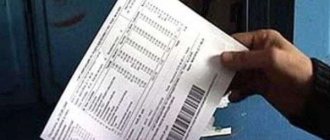Moscow, 09.09.2020, 13:15:47, editorial office of FTimes.ru, author Zoya Zharkova.
The difficult situation due to the coronavirus has led to thousands of Russians being unemployed, so the main issue on the agenda is how to pay utility bills.
According to the law, a citizen is charged a penalty for non-payment or late payment of housing and communal services; they are imposed for each day of delay, starting from the 31st day following the day of the due date for payment until the day of actual payment.
Written complaint
According to the lawyer, if a tenant has payment arrears, the utility company first notifies the tenant with a written claim demanding that the existing debt be repaid. And if the debtor does not reduce the debt within the prescribed period or does not try to agree on options for installment payments, a repayment schedule, and so on, then the parties risk meeting in court.
“Also today, according to current legislation, the service provider can immediately file a claim in court without a preliminary claim,” comments the lawyer. “And then the debtor will immediately receive a summons to court, which will indicate where, when and what time he will have to appear.
Utility services can collect rent debts only for the last three years, since according to the legislation of the Republic of Kazakhstan, the statute of limitations is 3 years.
Another surprise for the debtor will be the shutdown of water, electricity or heating. The reason for this may be either arrears in payment of utility bills of several tens of thousands of tenge, or ridiculous figures of 200-300 tenge.
According to the official website of Akmola Electricity Distribution Company JSC, the next stage of solving problems with debtor consumers who do not respond to written complaints in any way is to cut off the supply of electrical energy to subscribers. Then follows the filing of a statement of claim for forced collection of debt through the court. The travel of debtors outside the Republic of Kazakhstan is also limited.
How the law on KSK has changed in Kazakhstan >>>
Section XVI of the Rules. Responsibility of the performer and the consumer
149. The Contractor bears administrative, criminal or civil liability established by the legislation of the Russian Federation for:
a) violation of the quality of provision of utility services to the consumer;
b) harm caused to the life, health and property of the consumer as a result of a violation of the quality of provision of utility services, due to the failure to provide the consumer with complete and reliable information about the provided utility services;
c) losses caused to the consumer as a result of the contractor’s violation of consumer rights, including as a result of an agreement containing conditions that infringe on the consumer’s rights in comparison with these Rules;
d) moral harm (physical or moral suffering) caused to the consumer as a result of the contractor’s violation of consumer rights provided for by the housing legislation of the Russian Federation, including these Rules.
150. A contractor who has committed a violation of the quality of provision of a utility service due to the provision of a utility service to a consumer of inadequate quality and (or) with interruptions exceeding the established duration, is obliged, in accordance with the provisions of these Rules, to recalculate to the consumer the amount of payment for such a utility service in the direction of reducing it down to complete exemption of the consumer from paying for such a service.
In this case, the consumer has the right to demand from the contractor payment of penalties (fines, penalties) in the amount specified in the Law of the Russian Federation “On the Protection of Consumer Rights” in the cases specified in paragraph 157 of these Rules.
The contractor is released from liability for violation of the quality of provision of utility services if he proves that such a violation occurred due to force majeure circumstances or due to the fault of the consumer. Force majeure circumstances do not include, in particular, violation of obligations on the part of the contractor's counterparties or actions (inaction) of the contractor, including the lack of necessary funds from the contractor.
151. Damage caused to the life, health or property of a consumer due to a violation of the quality of provision of utility services or due to failure to provide the consumer with complete and reliable information about the provided utility services is subject to compensation by the contractor in full, regardless of the contractor’s fault. This damage is subject to compensation according to the rules provided for in Chapter 59 of the Civil Code of the Russian Federation.
The right to demand compensation for harm caused as a result of a violation of the quality of provision of public services is recognized for any victim, regardless of whether he was in a contractual relationship with the contractor or not.
Damage caused to the life, health or property of a consumer due to a violation of the quality of provision of utility services is subject to compensation within 10 years from the date of provision of such service. In this case, claims brought after 3 years from the date the right to compensation for such damage arose are satisfied for the past time no more than 3 years preceding the filing of the claim.
152. If the contractor causes damage to the life, health and (or) property of the consumer, the common property of the owners of premises in an apartment building, the contractor and the consumer (or his representative) draw up and sign an act of damage to the life, health and property of the consumer, the common property of the owners of the premises in an apartment building, containing a description of the damage caused and the circumstances under which such damage was caused.
The specified act must be drawn up by the contractor and signed by him no later than 12 hours from the moment the consumer contacts the emergency dispatch service. If it is impossible for the consumer (or his representative) to sign the act, including due to his absence from the occupied premises, the act must be signed in addition to the executor by 2 disinterested persons. The act is drawn up in 2 copies, one of which is given to the consumer (or his representative), the second remains with the contractor.
153. The contractor is responsible for damage caused to the life, health or property of the consumer in connection with the use of materials, equipment, tools and other means necessary for the provision of public services, regardless of whether the level of scientific and technical knowledge allowed them to identify their special properties or not .
The contractor is released from liability for causing harm if he proves that the harm was caused due to force majeure or violation by the consumer of the established rules for the consumption of utility services.
154. Losses are understood as expenses that a consumer, whose rights have been violated, has made or will have to make to restore the violated right (real damage), as well as lost income that this person would have received under normal conditions of civil circulation if his right had not been violated (lost profits).
Unless otherwise established by law, losses caused to the consumer are subject to compensation in the full amount in excess of the penalty (penalty) established by law or contract.
Payment of a penalty (penalty) and compensation for losses do not relieve the contractor from fulfilling his obligations in kind to the consumer.
The contractor is released from liability for failure to fulfill obligations or for improper fulfillment of obligations if he proves that the failure to fulfill obligations or their improper fulfillment occurred due to force majeure, as well as on other grounds provided by law.
The consumer's demands for payment of a penalty (fine) provided for by law or contract are subject to satisfaction by the contractor on a voluntary basis. If the court satisfies the consumer's requirements established by law, the court collects from the executor for failure to voluntarily satisfy the consumer's requirements a fine in the amount of 50 percent of the amount awarded by the court in favor of the consumer.
155. If the contractor, as a result of a violation of consumer rights provided for by the housing legislation of the Russian Federation, including these Rules, causes moral harm (physical or mental suffering) to the consumer, then, at the request of the consumer, the court may impose on the contractor the obligation of monetary compensation for this damage.
Compensation for moral damage is carried out regardless of compensation for property damage and losses incurred by the consumer.
155(1). In the event of a violation by the contractor, including a person hired by the contractor to carry out the functions of calculating fees for utility services, of the procedure for calculating fees for utility services, which resulted in an unreasonable increase in the amount of the fee, upon the request of the applicant, the contractor is obliged to pay the consumer a fine in the amount of 50 percent of the amount of the excess accrued fees above the amount of fees that should have been charged in accordance with these Rules, except for cases where such a violation occurred through the fault of the consumer or was eliminated before the application and (or) before payment by the consumer.
When a consumer receives a written application for payment of a fine, the executor, no later than 30 days from the date of receipt of the application, is obliged to check the correctness of the calculation of the amount of utility fees presented to the consumer for payment and make one of the following decisions:
a) on the identification of a violation (in whole or in part) and payment of a fine to the consumer (in whole or in part);
b) about the absence of a violation and refusal to pay a fine. (clause 155(1) introduced by Decree of the Government of the Russian Federation dated December 26, 2016 N 1498)
155(2). If a violation of the procedure for calculating fees for utility services is established, the executor ensures payment of the fine no later than 2 months from the date of receipt of the applicant’s request by reducing the amount of payment for the relevant utility service, and if the consumer has an outstanding debt confirmed by a judicial act that has entered into legal force - by reducing the amount arrears in payment of utility services until the fine is paid in full.
The specified fine is reflected in the payment document as a separate line. (clause 155(2) introduced by Decree of the Government of the Russian Federation dated December 26, 2016 N 1498)
156. The contractor has no right to perform additional work or provide services for a fee without the consent of the consumer. The consumer has the right to refuse to pay for such work (services), and if they are paid, the consumer has the right to demand that the contractor return the amount paid.
157. When the contractor provides the consumer with utility services of inadequate quality and (or) with interruptions exceeding the established duration, the consumer has the right to demand from the contractor payment of penalties (fines, penalties) in the amount specified in the Law of the Russian Federation “On the Protection of Consumer Rights”, in the following cases:
a) if the contractor, after concluding an agreement containing provisions on the provision of utility services, does not promptly begin to provide utility services;
b) if the total time of interruptions in the provision of utility services for the billing period exceeds the permissible interruptions in the provision of utility services established in Appendix No. 1 to these Rules;
c) if the pressure of cold or hot water and (or) the temperature of hot water at the point of water collection does not meet the requirements established by the legislation of the Russian Federation;
d) if the gas pressure in the consumer’s premises does not meet the requirements established by the legislation of the Russian Federation;
e) if the voltage and frequency parameters in the electrical network at the consumer’s premises do not meet the requirements established by the legislation of the Russian Federation;
e) if the air temperature in the consumer’s premises (including in a separate room in an apartment) is lower than the values established by the legislation of the Russian Federation by more than the permissible temperature deviation and (or) if the pressure in the intra-house heating system is less than the value specified in Appendix N 1 to these Rules. Unless otherwise established by the contract, the consumer has the right to require the contractor to pay penalties (fines, penalties) for poor-quality heating if the consumer takes measures to prepare the living space for use in the autumn-winter period (installation of sealing gaskets in the vestibules of window and door openings, replacement of broken glass, insulation of entrance doors to the premises, etc.);
g) if the emergency dispatch service does not register a consumer message about a violation of the quality of utility services or their failure to provide them;
h) in other cases provided for by the contract.
158. The consumer bears civil liability established by the legislation of the Russian Federation for:
a) failure to pay or late payment of utility bills;
b) harm caused to the life, health and property of the contractor or other consumers due to improper operation of indoor equipment (for a consumer in a residential or non-residential building in an apartment building) or in-house engineering systems (for a consumer in a residential building).
159. Consumers who have paid utility bills late and (or) incompletely are required to pay the contractor a penalty in the amount established by Part 14 of Article 155 of the Housing Code of the Russian Federation.
160. Damage caused by a consumer to the life, health and property of the contractor or other consumers due to improper operation of indoor equipment (for a consumer in a residential or non-residential building in an apartment building) or in-house engineering systems (for a consumer in a residential building) is subject to compensation by the consumer according to the rules, provided for by Chapter 59 of the Civil Code of the Russian Federation.
Trial
Well, if it comes to court, the process will most likely end in hassle and loss of time for both parties. However, it is worth keeping in mind that at this stage everything can be resolved peacefully. As a rule, judges invite the parties to enter into a guarantee agreement, according to which the debtor is obliged to repay his existing debt. In this case, the supply of, for example, electricity will not be interrupted.
For example, AAREC-Energosbyt LLP resorts to extreme measures if the debtor consumer does not respond to calls to pay for consumed electricity. For those subscribers who are faced with financial difficulties, AEDC-Energosbyt LLP meets halfway by drawing up a payment schedule in installments.
But if any of the parties does not agree, then the case will be considered on its merits. The duration of the proceedings depends on the complexity of the case itself. Perhaps the issue will be resolved within one or two hearings. But it is possible that the legal proceedings will drag on for several months.
What to do with a large utility debt
- Contact the housing office at your place of registration or the management company. You will be informed of the amount and penalties assessed, if any. But you should be prepared for the fact that in order to obtain the necessary information, the likelihood of standing in a long line is high, which means that a lot of time will be spent.
- Go to the website of your management company, register (for this you will need a phone number), log into your personal account, enter your personal account number.
- Use the services of a bank that provides services for paying for housing and communal services: register, log into your personal account. This way you can not only find out the amount of debt, but also pay it immediately if necessary.
We recommend reading: Payment Amount for New Housing to Reduce Emergency Housing from 2020
Seizure of property
If after the end of the trial, when the court has established the amount of debt plus a penalty that the debtor must pay, but he continues to ignore payments, then more stringent methods are used.
In case of untimely execution of a court decision on debt collection, the debtor's property is seized. They may concern his current accounts, movable (cars, motorcycles, household appliances, etc.) and real estate (apartments, houses, non-residential premises, land plots, garages, etc.).
In the absence of payment by court decision, public or private bailiffs may organize the following activities:
- holding auctions of movable and immovable property of the debtor;
- withholding funds from the debtor’s wages or pension payments in order to enforce a court decision;
- issuing collection orders to the current accounts of consumer debtors to remove the corresponding amounts of debt;
- imposing a ban on traveling outside the country, in accordance with the requirements established by Art. 33 of the Law of the Republic of Kazakhstan “On enforcement proceedings and the status of bailiffs”;
How to reduce home maintenance costs? >>>
Punishments and fines for non-payment of housing and communal services in 2020
At the same time, the defaulter himself must be able and willing to build a constructive dialogue with utility companies; he should not stand his ground and prove his innocence in such situations. However, on this basis, the amount of payment for heating, electricity and gas supply for heating residential premises is not recalculated, as well as for utilities for general house needs. In addition, the fee for the sewerage service (this is sewerage) will be recalculated only if the fee for the utility service for cold or hot water supply is recalculated. True, and cancel the judicial
Utility debts: law on debtors 2020
From the 31st to the 90th day of debt, a penalty is charged on the amount of the debt in the amount of 1/1300 of the refinancing rate, after 90 it will be 1/130. After the three-month period, people who refuse to pay utility bills receive the status of debtors.
The percentage of penalties depends on the period of non-payment: Penalties for late payment of housing and communal services for individuals: 1/300 of the Central Bank refinancing rate per day 1/130 of the Central Bank refinancing rate per day In modern management companies and homeowners associations, late penalties are calculated automatically using software.
Administrative responsibility
Also, the legislation of the Republic of Kazakhstan provides for administrative liability, regulated by Article 524 of the Code of the Republic of Kazakhstan “On Administrative Violations”, in the form of imposing a fine on individuals in the amount of up to 10, and on officials in the amount of up to 20 monthly calculation indices. Administrative arrest for up to 10 days and criminal liability for malicious failure to comply with a judicial act (court decision) that has entered into legal force, provided for in Article 362 of the Criminal Code of the Republic of Kazakhstan, are also possible.








